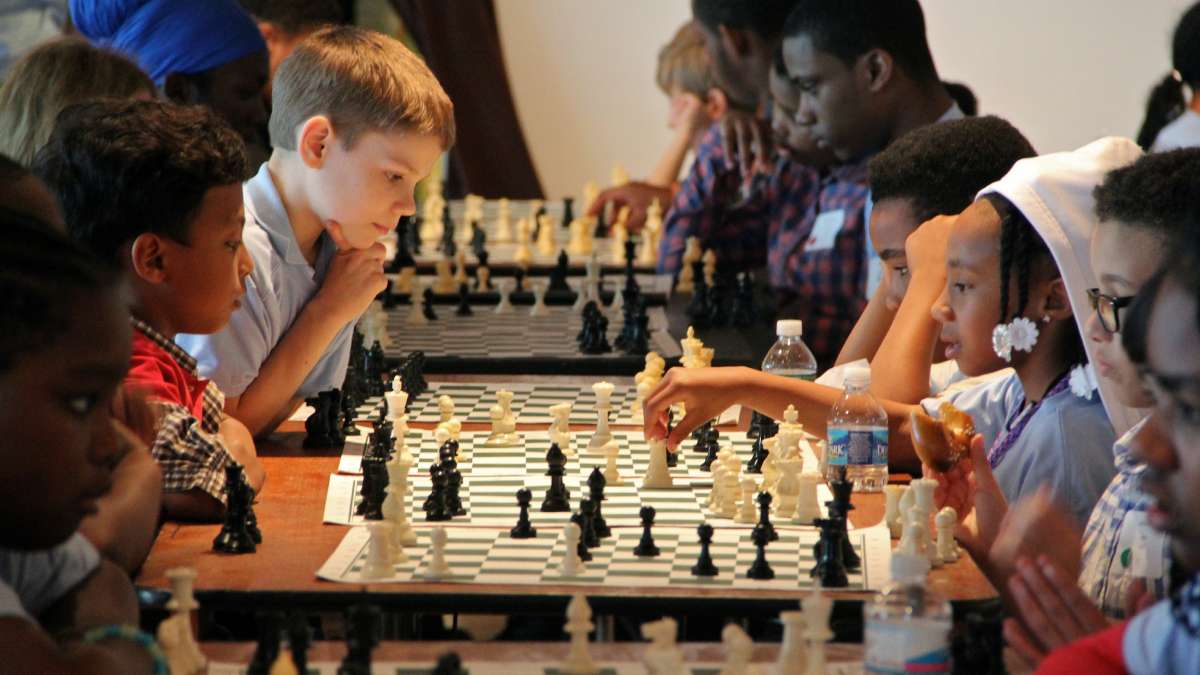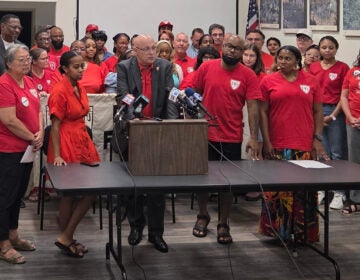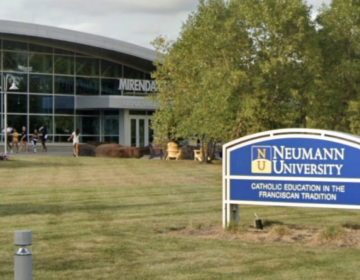Serious fun: Philly to rethink after-school, summer programs

After School Activities Partnerships (ASAP) runs chess programs for Philadelphia students. (Emma Lee/WHYY
Philadelphia will formally unveil a new initiative to improve the city’s out-of-school-time programs Thursday.
Sounds dry, but lurking below the surface is an intriguing idea: What if Philly treated extracurricular programming with the sort of intentionality and seriousness typically applied to in-school programming?
“If we can build the quality and have a set of outcomes that we think are important — that we know are important for kids’ success in school and success in their future life — we will be knitting together a system that can perform at a level that it never performed before,” said Mike DiBerardinis, the city’s managing director.
Systematically tracking quality and outcomes is second nature to those in the K-12 realm, but it would be new territory for the out-of-school time or OST sector. The city spends about $40 million every year for out-of-school time programs, but DiBerardinis said relatively little is known about well each one works.
“Spending that money with a little more intention can make a really big difference,” he said.
Another goal of this new Out-of-School-Time Initiative? Better coordination among programs in the city’s sprawling network of after-school and summer options. Even within city government, the main channels for providing out-of-school programming — Parks and Recreation, the Free Library, and the Department for Human Services — tend to be siloed.
“I think the system has been running without enough intention,” said DiBerardinis. “So what we’re trying to do is raise the intentionality of what we do with children after school.”
Is all this necessary?
Kids go to after-school clubs and summer camps to blow off steam; they’re not the type of places where you comb over outcomes.
Advocates argue, however, that much of a child’s life is spent out of school. And, often, what he or she does in that time shapes them, said Justin Ennis, executive director of After School Activities Partnerships.
“If you ask any parent, ‘What’s your kid into these days? What’s up with your kid?’ they’re probably gonna talk about extracurricular activities,” said Ennis. “‘Oh, he’s in soccer and he’s loving it. He’s in a music program and it’s done these wonderful things for him.’
“They’re not gonna talk necessarily about what’s happening in social studies class.”
Ennis said hopes the OST Initiative will elevate the perception of after-school and summer activities, which he believes are too often viewed as “baby-sitting.” The feeling among Ennis and his colleagues is that out-of-school time — if used well — can drive academic achievement.
Philadelphia Mayor Jim Kenney seems to agree, and his office views the OST initiative as the first comprehensive review, assessment, and reordering of the city’s out-of-school ecosystem. It also sees the OST push as a complement to rebuilding the city’s parks and recreation centers and its community schools initiative.
A quality quandary
All of that sounds tidy in theory, but what kind of tangible products will the OST initiative produce?
Right now it’s tough to tell. Thursday’s event will simply kick off the public conversation.
In the short term, the project’s goals are largely structural. They include plans to:
study the OST landscape and find out where there’s a dearth of programming;
forge a plan to professionalize and support the city’s OST workforce;
agree on how the system defines “quality.”
Defining quality, in particular, is central to the initiative. And it could prove difficult thanks to the sheer diversity of out-of-school programs. How does one set a standard that could apply equally to a tutoring program and a tennis club?
The city has hired the nonprofit Research for Action to explore the literature on quality OST programs and ask providers how they view quality. RFA is also examining trends and best practices in the OST workforce, as well as methods for folding more literacy programs into after-school and summer programs.
The organization will produce a trio of reports in the coming months that will guide Philadelphia’s approach, according to Tracey Hartmann, senior research associate at RFA .
In many ways, the emerging conversation around OST mirrors that around pre-K — albeit at an earlier stage. Philadelphia and other cities have promoted the idea that pre-K quality matters (and should be tracked), displacing the notion that it is simply a form of day care. The state’s four-star rating system for early-childhood programs has become a linchpin of the city’s pre-K expansion, with money targeted toward centers that receive high marks.
Could Philadelphia develop a similar scale for OST programs?
That’s unlikely, said Department of Human Services Commissioner Cynthia Figueroa, but there’s a concerted push to create a uniform notion of what works and what doesn’t.
“How do we ensure that there is some rigor in the standards that we create in terms of both the training, staffing, and offerings?” said Figueroa.
Also, how can the city integrate academic goals, such as early literacy, without draining programs of their appeal?
“We don’t want to take the fun away,” said Figueroa.
What’s clear is that the city wants to define quality; agree on outcomes as program goals; and track how programs progress.
“We have a set of outcomes we think are important,” said DiBerardinis. “We want to vet those outcomes.”
One of the initiative’s early objectives is to collect common data points and create long-term data goals. Eventually, the plan calls for programs to “use data for decision-making,” according to a draft of the initiative’s logic model.
Looking to Providence as model
Philadelphia is not the first city to travel this road with out-of-school-time programs.
Almost exactly five years ago, Philadelphia was one of nine cities to receive a Wallace Foundation grant to improve the quality of OST. In 2003, Wallace gave similar grants to five other cities, including Providence, Rhode Island.
Philadelphia officials point to Providence as a potential model for their own improvement efforts.
Launched in 2006, the Providence After School Alliance now enrolls about 30 percent of the city’s middle-school students, said executive director Hillary Salmons.
She describes the alliance as the “air traffic control” of after-school programs in Rhode Island’s largest city. PASA works with 80 to100 nonprofit providers in a given semester and coordinates all logistics. It provides transportation, scheduling, and meals.
PASA also sets quality benchmarks for nonprofits that want to be part of the alliance and evaluates programs to weed out those that aren’t up to snuff. In particular, PASA roots out programs with low attendance and those that don’t yield desirable outcomes such as reduced absenteeism or skills acquisition.
This is no guarantee that Philadelphia will create its own, separately branded coalition of vetted after-school programs. But the city may entertain the idea at some point.
“This is a real national movement, and we want Philadelphia to be part of it,” said Salmons.
This disclosure: Avi Wolfman-Arent worked at After School Activities Partnerships seven years ago. Justin Ennis was not executive director at the time.
WHYY is your source for fact-based, in-depth journalism and information. As a nonprofit organization, we rely on financial support from readers like you. Please give today.





